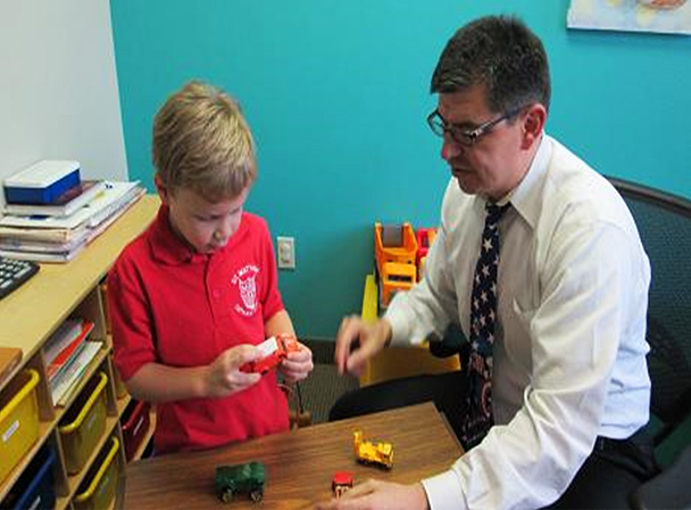Section of Developmental Behavioral Pediatrics

Welcome

The main role of developmental-behavioral pediatricians is to evaluate kids who aren’t developing, learning, or behaving the way their peers are. Developmental-behavioral pediatricians help parents and caregivers understand their child’s issue and its effects on the family. They also teach parents and caregivers to advocate for their child. The goal is to ensure that the child receives all supports and services they need. This includes therapy, school services and support from community agencies.

Abby Sevigny obtained her Bachelor of Science in Nursing from Auburn University. She worked as a nurse in the Neonatal ICU, pediatric ICU, pediatric cardiac ICU, and developmental pediatrics before obtaining her Doctor of Nursing Practice degree from UT Health in San Antonio. She now works as a primary care pediatric nurse practitioner in pediatric development and behavior. Her clinical and research interests include complex newborn care, pediatric cardiac disorders, and parent empowerment.
Your child’s primary care provider may consult a developmental-behavioral pediatrician to evaluate for:
- Autism spectrum disorder (ASD)
- Behavioral problems that are severe and interfere with daily function (e.g., a child dismissed from daycare because of aggression toward classmates)
- Attention-deficit/hyperactivity disorder (ADHD) that has not improved despite maximal dosing of the appropriate medication
- Developmental delays that don’t improve after six months of therapy
- Diagnostic confusion (e.g., bipolar, ASD, ODD and OCD in same patient)
- Pediatric feeding disorder. PFD is difficulty eating or refusing to eat an age-appropriate diet or not eating enough to gain weight and grow
- Genetic and chromosomal disorders
- Trisomy 21 (Down syndrome) not developing as expected for that condition
- Global developmental delay – Showing delays in several areas of development
- Intellectual disability – Limited mental, social, conceptual, and practical abilities
- Parent-child conflict (sometimes called “oppositional-defiant disorder”)
- Weight faltering (sometimes called “failure to thrive”) – Weight-to-length ratio or body mass index below the fifth percentile, rather than simply “low weight”
- Under-controlled, impulsive, or aggressive behaviors that interfere with daily life
- Anxiety disorders such as selective mutism
Why Would a Developmental-Behavioral Pediatrician Not See My Child?
Our developmental-behavioral pediatrician is unable to evaluate for any of the following:
- Isolated language or motor delay responding well to therapy. These children are progressing and
- do not need further evaluation.
- Initial ADHD evaluation or management for children aged 4 and older. Per the American Academy
- of Pediatrics, this is the primary care provider’s responsibility.
- Learning disability (e.g., dyslexia). If your child 7 or older and has difficulty learning one subject,
- please request in writing formal testing by the local public school district.
- Uncomplicated trisomy 21 (Down syndrome). Per the American Academy of Pediatrics, this is the
- primary care provider’s responsibility.
- Uncomplicated preterm infants and NICU graduates. The University Health PREMIEre clinic
- manages these patients, that may be later referred if delayed or not responding to treatment.
If your child has undergone any previous evaluations (e.g., audiology, speech, child neurology or school testing), the developmental-behavioral pediatrician will need copies of those documents. This helps the doctor see the “big picture.”
Management
Rely on your developmental-behavioral pediatrician to help guide the best care plan for your child and family.
This may include:
- Applied behavior analysis (ABA) therapy, feeding therapy, occupational therapy, orientation &
- mobility (i.e., vision) therapy, physical therapy, or speech therapy
- Guidance and counseling for you to better manage your child’s behavior
- Consulting other pediatric subspecialists (e.g., child neurology, pediatric gastroenterology)
- Special education services in public school
- Medications to target specific symptoms
What Can I Do before My Child Sees the Developmental-Behavioral Pediatrician?
If your child is 0 to 35 months old: You or your primary care provider can contact Early Childhood Intervention (ECI). ECI evaluates infants and toddlers to see if they need therapy. ECI will provide therapy in your home or at daycare for free.
- Visit ECI Program Search (state.tx.us)
- Call 1-877-787-8999
If your child is age 36 months to 6 years: You can contact the elementary school nearest your home. Ask them in writing to evaluate your child for Early Childhood Special Education eligibility.
If there is concern about autism spectrum disorder. Your child’s primary care provider must refer for both of the following:
- Audiology: To evaluate for hearing loss
- Speech and language evaluation
- For adolescents and young adults with developmental delays:
- Refer to The Arc of San Antonio for support
Clinic information:
Pediatric Subspecialties Clinic
Gateway Wurzbach Pediatric Clinic
8435 Wurzbach Rd., Suite 311
San Antonio, TX 78229
Phone number to schedule an appointment: 210-450-7334
Referral Fax number: 210-450-2124
UT Health San Antonio
Division of Pediatric Neurology
Sandra CedilloDivision Administrator

